

Neuroscience. Probing the Unconscious Mind. SIGMUND FREUD popularized the idea of the unconscious, a sector of the mind that harbors thoughts and memories actively removed from conscious deliberation.
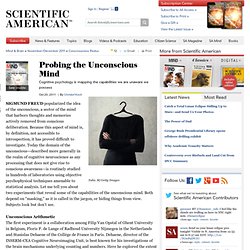
Because this aspect of mind is, by definition, not accessible to introspection, it has proved difficult to investigate. Your Brain Knows a Lot More Than You Realize. Meanwhile, a similar story was unfolding oceans away.
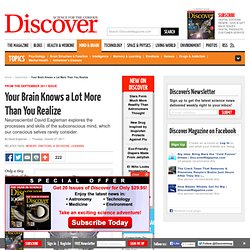
During World War II, under constant threat of bombings, the British had a great need to distinguish incoming aircraft quickly and accurately. Which aircraft were British planes coming home and which were German planes coming to bomb? Several airplane enthusiasts had proved to be excellent “spotters,” so the military eagerly employed their services. These spotters were so valuable that the government quickly tried to enlist more spotters—but they turned out to be rare and difficult to find.
The government therefore tasked the spotters with training others. It was a grim attempt. With a little ingenuity, the British finally figured out how to successfully train new spotters: by trial-and-error feedback. The Knowledge GapThere can be a large gap between knowledge and awareness. Consider patients with anterograde amnesia, who cannot consciously recall new experiences in their lives. What Douglas experienced is called anosognosia.
Thou Can’t Not Covet. How Our Brains Navigate the City - Commute. To navigate certain parts of New York City — namely Queens and much of Manhattan — all you need to be able to do is count.
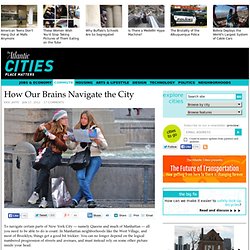
In Manhattan neighborhoods like the West Village, and most of Brooklyn, things get a good bit trickier. You can no longer depend on the logical numbered progression of streets and avenues, and must instead rely on some other picture inside your head. For a while now psychologists have debated just what that picture looks like.
Some believe we need to orient ourselves by local reference points. Under this theory, we're lost until we see that certain street or certain landmark, at which point the rest of the grid emerges in our minds. A third alternative suggests that our internal GPS system is informed by frequently looking at maps. Frankenstein and colleagues recruited 26 people from Tübingen to participate in a test of spatial knowledge of their home. The split brain: A tale of two halves. In the first months after her surgery, shopping for groceries was infuriating.
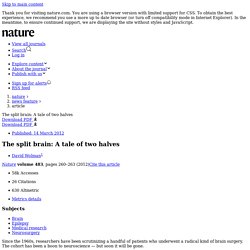
Standing in the supermarket aisle, Vicki would look at an item on the shelf and know that she wanted to place it in her trolley — but she couldn't. “I'd reach with my right for the thing I wanted, but the left would come in and they'd kind of fight,” she says. “Almost like repelling magnets.” Eureka! When a Blow to the Head Creates a Sudden Genius - Brian Fung - Health. Brain injuries can sometimes reveal extraordinary talents in people.
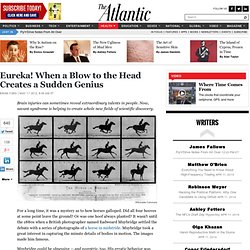
Now, savant syndrome is helping to create whole new fields of scientific discovery. Wikimedia Commons For a long time, it was a mystery as to how horses galloped. How Exercise Jogs the Brain. The lifelong mental benefits of exercising have long been known, from improving learning in kids to staving off dementia in seniors.
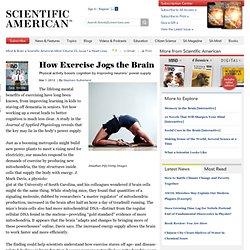
Yet how working up a sweat leads to better cognition is much less clear. How Emotions Jump from Face to Face. Disability advocates were seeing red after two elderly women with medical conditions were allegedly strip-searched by TSA agents at New York’s JFK airport last December.
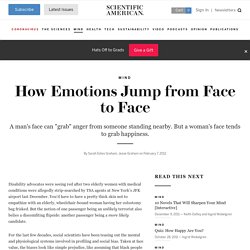
You’d have to have a pretty thick skin not to empathize with an elderly, wheelchair-bound woman having her colostomy bag frisked. But the notion of one passenger being an unlikely terrorist also belies a discomfiting flipside: another passenger being a more likely candidate. For the last few decades, social scientists have been teasing out the mental and physiological systems involved in profiling and social bias. Subtle Multisensory Clues Reveal Other People's Emotions. When someone approaches you to ask, “What’s wrong?”
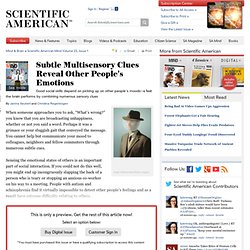
You know that you are broadcasting unhappiness, whether or not you said a word. Perhaps it was a grimace or your sluggish gait that conveyed the message. You cannot help but communicate your mood to colleagues, neighbors and fellow commuters through numerous subtle cues. Scientists Manipulate and Erase Memories. No one has a photographic memory. Kaavya Viswanathan has an excuse.
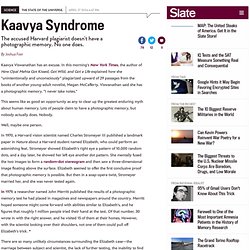
In this morning's New York Times, the author of How Opal Mehta Got Kissed, Got Wild, and Got a Life explained how she "unintentionally and unconsciously" plagiarized upward of 29 passages from the books of another young-adult novelist, Megan McCafferty. Viswanathan said she has a photographic memory. "I never take notes. " This seems like as good an opportunity as any to clear up the greatest enduring myth about human memory. Attention Tunes The Mind's Ear. The Secrets of Your Brain's Zoom Lens. Notice that, even as you fixate on the screen in front of you, you can still shift your attention to different regions in your peripheries.

For decades, cognitive scientists have conceptualized attention as akin to a shifting spotlight that “illuminates” regions it shines upon, or as a zoom lens, focusing on things so that we see them in finer detail. These metaphors are commonplace because they capture the intuition that attention illuminates or sharpens things, and thus, enhances our perception of them. Some of the important early studies to directly confirm this intuition were conducted by NYU psychologist Marisa Carrasco and colleagues, who showed that attention enhances the perceived sharpness of attended patterns. In their experiment, participants saw two textured patterns presented side-by-side on a computer screen, and judged which of the two patterns looked sharper.
Are you a scientist who specializes in neuroscience, cognitive science, or psychology? Woman With Perfect Memory Baffles Scientists. James McGaugh is one of the world's leading experts on how the human memory system works. But these days, he admits he's stumped. McGaugh's journey through an intellectual purgatory began six years ago when a woman now known only as AJ wrote him a letter detailing her astonishing ability to remember with remarkable clarity even trivial events that happened decades ago.
Give her any date, she said, and she could recall the day of the week, usually what the weather was like on that day, personal details of her life at that time, and major news events that occurred on that date. Like any good scientist, McGaugh was initially skeptical. But not anymore. Why Is Memory So Good and So Bad? What did you eat for dinner one week ago today? Chances are, you can’t quite recall. But for at least a short while after your meal, you knew exactly what you ate, and could easily remember what was on your plate in great detail.
What happened to your memory between then and now? Did it slowly fade away? Psychology. Audio Excerpt: The Secret Lives of the Brain. Most people probably feel like they know their own brain reasonably well. After all, our thoughts form the core of who we are, or at least who we understand ourselves to be. But it turns out we know only a tiny portion of what our brains are doing and where our own thoughts come from. LISTEN: Excerpt from Incognito. UCSB scientists discover how the brain encodes memories at a cellular level. (Santa Barbara, Calif.) –– Scientists at UC Santa Barbara have made a major discovery in how the brain encodes memories. The finding, published in the December 24 issue of the journal Neuron, could eventually lead to the development of new drugs to aid memory. The team of scientists is the first to uncover a central process in encoding memories that occurs at the level of the synapse, where neurons connect with each other.
"When we learn new things, when we store memories, there are a number of things that have to happen," said senior author Kenneth S. The Singularity is Far: A Neuroscientist's View. David J. Linden is the author of a new book,The Compass of Pleasure: How Our Brains Make Fatty Foods, Orgasm, Exercise, Marijuana, Generosity, Vodka, Learning, and Gambling Feel So Good. He is a professor of neuroscience at The Johns Hopkins University School of Medicine and Chief Editor of the Journal of Neurophysiology. Ray Kurzweil, the prominent inventor and futurist, can't wait to get nanobots into his brain. In his view, these devices will be equipped with a variety of sensors and stimulators and will communicate wirelessly with computers outside of the body.
The Brain: A Body Fit for a Freaky-Big Brain. Aiello and Wheeler noted that this dramatic increase in brain size would seem to have required a dramatic increase in metabolism—the same way that adding an air-conditioning system to a house would increase the electricity bill. Yet humans burn the same number of calories, scaled to size, as other primates. Somehow, Aiello and Wheeler argued, our ancestors found a way to balance their energy budget. The Mind's Hidden Switches: Scientific American Podcast. Podcast Transcription. The 'rich club' that rules your brain - life - 02 November 2011.
Not all brain regions are created equal – instead, a "rich club" of 12 well-connected hubs orchestrates everything that goes on between your ears. This elite cabal could be what gives us consciousness, and might be involved in disorders such as schizophrenia and Alzheimer's disease. The Learning Brain Gets Bigger. With age and enough experience, we all become connoisseurs of a sort. What's Wrong With the Teenage Mind? "What was he thinking? " The Two Year Window. A decade ago, a neuroscientist named Charles Nelson traveled to Bucharest to visit Romania’s infamous orphanages. Tracking the tell-tale signs of pure genius.
Age-Related Memory Loss Reversed in Monkeys. Exceptional Memory Explained: How Some People Remember What They Had for Lunch 20 Years Ago. Researchers from the University of California, Irvine reported in 2006 on a woman named Jill Price who could remember in great detail what she did on a particular day decades earlier. Meditation found to increase brain size.
Kris Snibbe/Harvard News Office Sara Lazar (center) talks to research assistant Michael Treadway and technologist Shruthi Chakrapami about the results of experiments showing that meditation can increase brain size. Your Brain on Facebook : Bigger Social Networks Expand the Size of Neural Networks. A recent study showed that certain brain areas expand in people who have greater numbers of friends on Facebook. This was welcome news for online social network addicts, particularly teenagers: "Mom, I'm not just on Facebook; I'm doing my temporal lobe calisthenics.
" There was a problem, though. The Science of Sarcasm? Yeah, Right. Social Networks Matter: Friends Increase the Size of Your Brain. The Limits of Intelligence. Quantum minds - life - 05 September 2011. Banishing consciousness: the mystery of anaesthesia - health - 29 November 2011. The Burden of Lying. Why our brains make us laugh - Ideas. How People are Fooled by Evidence. Why we screw up when the heat is on - life - 11 July 2011.
Lies We Tell Ourselves. Why we have brain farts, and what scientists are doing to stop them. Zap your brain into the zone: Fast track to pure focus - life - 06 February 2012. Are Prodigies Autistic? Ego Depletion. Creativity tied to mental illness. The Improvisational Brain. Brainstorming Doesn’t Really Work. Why Does Beauty Exist? Please pay attention to the notes. The Benefits of Daydreaming. The "multiple reflection error" - yet another way that we misunderstand mirrors.
The New Science Behind Your Spending Addiction. Why 'Uncanny Valley' Human Look-Alikes Put Us on Edge. Why the Left-Brain Right-Brain Myth Will Probably Never Die. Do thoughts have a language of their own? - opinion - 08 December 2011. Grief without Tears. Is There a Difference between the Brain of an Atheist and the Brain of a Religious Person? The Ductile Helix: "Jumping Genes" May Influence Brain Activity. Jumping Genes in the Brain Ensure That Even Identical Twins Are Different.
Could Conjoined Twins Share a Mind? Hunters of Myths: Why Our Brains Love Origins. The Hidden Potential of Autistic Kids. Stuttering Reflects Irregularities in Brain Setup. Thinking in a Foreign Language Makes Decisions More Rational. Put Your Creative Brain to Work. Is Sensitivity a Curse or a Blessing? My Latest on The Orchid-Dandelion Hypothesis. A brief history of the brain - life - 26 September 2011. Top Multitaskers Help Explain How Brain Juggles Thoughts. Making Sense of the World, Several Senses at a Time. The story of the self. You Have a Hive Mind.
Emotion Selectively Distorts Our Recollections. The Hidden Logic of Deception. What You Don't Know Can Kill You. Why you probably won’t experience your own traumatic death. Old Memories Interfere With Remembering New Ones. The Illusion of Asymmetric Insight. Bias rules the way we judge the world. The Overjustification Effect. Revisiting why incompetents think they’re awesome.
The ghostly gaze and the disappearing bust of Voltaire. The Cognitive Science of Rationality. Why Daydreaming Makes You Smarter and More Creative. How Should We Make Hard Decisions? Time on the Brain: How You Are Always Living In the Past, and Other Quirks of Perception. Why Does Time Fly? What is the Sex of 17?
10 Ways Our Minds Warp Time. A Quest to Understand How Memory Works. Imagining the Future Invokes Your Memory. Why Interacting with a Woman Can Leave Men "Cognitively Impaired" Does your brain produce new cells? Is the Purpose of Sleep to Let Our Brains “Defragment,” Like a Hard Drive? Lucid dreaming: Rise of a nocturnal hobby. The Brain May Disassemble Itself in Sleep.